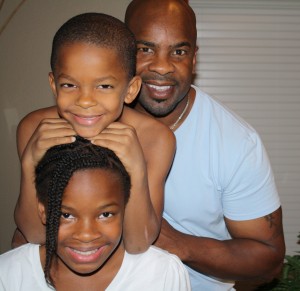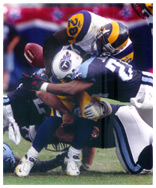Bethel University students are discouraged from using Wikipedia for academic research … but one CPS student ended up there for a completely different reason. Search Wikipedia for “Stephen Wayne Jackson,” and you’ll find a former football star who’s now scoring big in our Organizational Leadership Program.
Steve, who played defensive back for the Houston Oilers/Tennessee Titans from 1991 to 1999, made it all the way to Super Bowl XXXIV, where he and his team took on the St. Louis Rams. Although the Titans lost 23-16, Steve says the experience was “absolutely amazing.”
“I was in my ninth year as a professional player. I had gone to the playoffs and achieved some success. But Super Bowl is everything, times 10, squared,” he says. “The excitement, the buzz in the air, the media attention, the way the focus ramps up – it’s just the ultimate experience.”
Second only to … this interview?
“Really. That’s true. I never, ever thought I would be interviewed by my one-day alma mater,” he says seriously. “It’s an incredible honor.”
And a long time coming. Calling his educational path a “25-year plan to graduation,” Steve went to Purdue University in 1987, but left there in 1990 to join the Houston Oilers. “I always said I’d go back to college … and then I looked up, and I had gone from being 21 to being 45 years old.”
He was inspired by a teammate, Marcus Robertson. Marcus had gone to Bethel, earned his degree, and raved about his experience. Steve was moved and motivated. But more importantly, he says, “I was just tired of being a hypocrite.”
He had coached for the Buffalo Bills, the Washington Redskins and the Detroit Lions for 12 years. “I told my players they had to get their degree. I tell my kids they will get their degree. But, when it came to finishing my degree, I had every excuse in the book.”
Coaching is a fulltime job, all year long. But after retiring to become an entrepreneur in Houston, Steve no longer had a grueling schedule. “There’s no draft, no training camps. And all of the excuses I had, I don’t have now.”
Now in his second class, Steve is tackling every assignment, and catching every opportunity.
“Actually, I love it. It’s revitalized a thirst in me that I thought had long been quenched. Talking to my classmates about issues outside of football has been stimulating,” he says. “It gives me insight into things that are going on outside the NFL.”
He equates Organizational Leadership with coaching. “They are not just similar, they’re exactly the same. At the end of the day, professional coaching is a business. There are 32 owners who hire presidents, who then hire managers, who then hire employees – the players. There’s marketing, there’s motivating the workers. My experience coaching NFL really helped me understand business, more than anything.”
But what does a successful businessman and father of two — daughter Dominique is 13, and Stevie is 9 — hope to gain by earning this degree?
“I hope to get out of it that it’s mine,” he says firmly. “As a coach you can be fired, as a player you can be cut. But no matter what happens to me, I can tell my own children and those that I mentor that no one can take this degree away from me, and no one can take a degree away from them. Nobody.”
In fact, he’s passing on this message through the newly-formed Steve Jackson Foundation, a non-profit organization that will be up and running in July.
“I want to remind others that the combination of education, health, and athletics can mold people. Coaches used to be mentors. They should be mentors.” Steve’s camp will bring together athletes, leaders in the community, parents and students. “We’re telling them they’ve got to have the grades, and they’ve got to stay on the right track. We’re going to show the students and their parents what that track is.”
Steve Jackson’s track led from college, to the Super Bowl, to coaching … and now, to Bethel University. As he put it, “No matter how far removed you are from school, it’s never too late for you to go back and finish your degree and reach your goals. Life is a long journey, and just like in sports, it’s not how you start — it’s how you finish.”
– By PR Director Cindy Chambers


